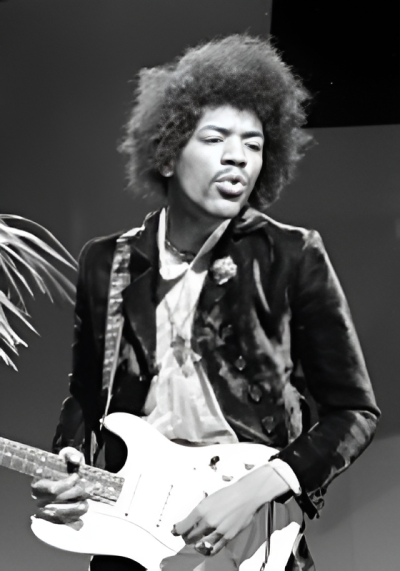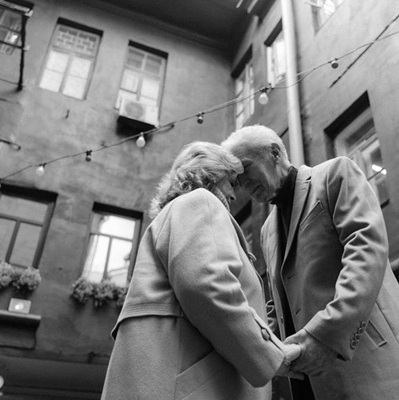.
.
A. Vente, CC BY-SA 3.0 NL, via Wikimedia Commons

Jimi Hendrix, 1967
.
.
___
.
.
Hendrix
.………for Chris
“Suddenly I realize
That if I stepped out of my body I would break
into blossom.” …from “A Blessing” by James Wright
Purple Haze
was in our brains
all that summer of 68
while Jimi sang,
his hair a dark nimbus
against the shifting lights
His fingers moved in voodoo spells
and we had trouble following at first
but we followed
the notes not steppingstones
but electric arcs we rode
from synapse to synapse to
spiral slides of stars
or staircases we climbed to the place
behind the waterfall
Jimi courted infinity
and we dove with him
into streams of acid
or inhaled rivers of smoke
as if we could force its blossom
as if we could recognize its face
as if we could kiss the sky
It is 1200 years since Li Po
drowned in the moon’s kiss
and too much wine
We are warned to be cautious
for Rumi says you are drunk
and this is the edge of the roof
but still James Wright stands in the wind
and his bones turn to dark emeralds
wait for the gift
it will come
suddenly you will burst into blossom
suddenly you will want to sing
scuse me while I kiss the sky
.
by Cheryl Savageau
.
.
___
.
.
Jimi Hendrix
Your tears caused meteor showers
Raining peace on the world
And Vietnam was little more than
A bad dream, your guitar
Shot down fire like an eager dragon
Destroying Republican and Democratic
Lies, I see your Stratocaster guitar
Alabaster, white as the waves, coming in
Off the ocean, sometimes the waves morphed
Into a mermaid who became your lover
Her melody became your favorite love
Potion.
Voodoo Chile, Voodoo Chile, play your six
String and drive the Gods wild, a naked
Woman copies the curves of your guitar
Sways her hips to your song, peace rising
From your guitar to say hello to mere mortals
In other worlds, you tell them peace is coming
And it won’t be long.
.
by Erren Geraud Kelly
.
.
___
.
.
Jimi
I got a preview
Of where we’re at now
Many years ago,
Back in the ‘60s.
I was going to school
In Reading, Pennsylvania,
Trying to get a college degree
And, at the same time,
Doing my best to avoid the draft.
Anyway, a good friend of mine,
Who lived his life for music,
Moved to Reading
And got a job in a factory
To pay his rent
And help cover the costs
Of our trips to Philadelphia
To see the bands we loved.
He would buy the tickets
And I would drive us
Down into the city.
It was announced
That Jimi Hendrix would play
The Electric Factory
In February of ’68 and,
As he was our favorite musician,
We hopped in my car
And headed for the City
Of Brotherly Love.
Somewhat before that,
Frank Rizzo had become
The Commissioner of Police
In Philly and he’d wasted no time
In putting his stamp on the force.
He was a racist bully,
Just like Donald Trump,
And his take no prisoners policy
Was wearing everyone down.
When we got out of my car
We noticed how grey
Everything had become.
We filed into the Factory
On what we expected to be
A historic evening, yet we
Both commented on how quiet
Everyone was; depressed even,
But I was still in a great mood.
Axis: Bold As Love had just dropped,
And the last track on that record
Had become my favorite song —
The music seems to be fading,
But then Hendrix suddenly shifts gears
And comes blasting back in
As if he’s finally breaking free
Of these earthly bonds.
Of course I was hoping
He’d play it.
Hendrix kicked off his set
And I was aware of how passive
The audience remained —
He seemed aware, too.
As he played, I could almost
See what he was thinking.
When he got near the end,
The place where he’d usually
Smash his guitar into an amp,
Or bash it onto the floor,
He paused, looked at his amp,
Then glanced at the audience.
He looked down at his guitar
Then back at us again,
And I could see the calculation:
We weren’t worth it —
The whole dismal city
Wasn’t worth it.
He laid his guitar down
And walked off the stage.
I was bitterly disappointed,
But I understood. My friend
And I split and got into my car.
I pulled out, just making it
Though a yellow light,
And was greeted by a siren
From an unmarked cruiser.
I rolled down my window and said
“But, sir, it hadn’t turned red yet.”
In return, I got a tongue lashing
From the nastiest cop
I’d ever dealt with.
He gave me a ticket
With his other hand
On his holster.
.
by Ron Kolm
.
.
___
.
.
Baby Hendrix Howl
Three days since this baby’s birth,
there’s nothin’ cuter on this earth. But
the crib can’t seem to hold him, tight
cottony swaddling meant to enfold him.
He thunders electric, skyscraping wails,
ear-piercing notes atop a chromatic scale.
Metal bars no hindrance for that piercing
shriek, that baby call. His real name’s Art
but he’s already Hendrix to us all. Uh-oh.
No way. Oh no. That bundling bunting
eight pounds of baby dough, a tiny face
with a colossal mouth of O!
Small eyes and nose sliding ‘neath
a soulful yowl. Though unsuspecting,
he’s already juicin’ rock ‘n roll. Like
Jimi H, he bellows high-volume blues
with his wah-wah, Uni-Vibe and Suzie Q’s.
At ten, he’ll be askin’ for tattoos!
His lungs gotta be humongous, amped up in
overdrive, built-in tone-altering effects, fuzz
distortion, bees off the hive. Surmise him at twelve,
stereophonic, high-velocity licks, feedback from
a Fender Strat. Playin’ his axe with his teeth—
’cause he don’t need no stinkin’ pics.
Even now asleep, Art diggin’ deep,
he be sparkin’ the tremolo. Dreamin’
contrapuntal motion, boltin’ arpeggio.
Wild Thing can set a room on fire with just
a toothless squeal, stir things inside
our bodies we never thought we’d feel.
Sing loud, sing true, croon
authentic you, rock out
you Art-ful melody. Pulse
world, quake love, chant you,
paint glee, just truly joyful be.
Joyful we. Joyous be.
.
by C. J. Trotter
.
.
Listen to the 1967 recording of The Jimi Hendrix Experience play Hendrix’s composition “Little Wing,” with Hendrix (guitar); Noel Redding (bass); and Mitch Mitchell (drums). [Legacy]
.
.
_____
.
.

Erren Kelly is a three-time Pushcart nominated poet from Boston whose work has appeared in 300 publications (print and online), including Hiram Poetry Review, Mudfish, Poetry Magazine, Ceremony, Cacti Fur, Bitterzoet, Cactus Heart, Similar Peaks, Gloom Cupboard, and Poetry Salzburg.
Click here to read “Under Quarantine” — COVID-era poetry of Erren Kelly, published by Jerry Jazz Musician
.
.
___
.
.

Ron Kolm is a contributing editor of Sensitive Skin. He is the author of Divine Comedy, Duke & Jill, Suburban Ambush, A Change in the Weather, Welcome to the Barbeque, Night Shift, Swimming in the Shallow End, The Bookstore Book: A Memoir, and The Verities of Love. His papers were purchased by the New York University Library. He’s also involved with several other archives: SUNY Buffalo, Ohio State University, the Harry Ransom Center and the main New York Public Library
.
.
___
.
.
Cheryl Savageau is a poet, memoirist, children’s book author, textile artist and former pianist/vocalist. Honors include Fellowships from the NEA, Massachusetts Artists Fellowship Program, four Fellowships from MacDowell, two Pushcart nominations, and Paterson Poetry Prize finalist. She is singing the blues and writing poetry for two new collections.
.
.
___
.
.

C. J. Trotter (a.k.a. Christine Trotter) is a poet and fiction writer based in New York City. She has been nominated for 2024’s Best of the Net, and one of her poems was published in Poetry Daily. Her work has appeared in RockPaperPoem, Euphony, Crack the Spine, FishFood, Spank the Carp, Elm, Typehouse, Cimarron Review, and Jerry Jazz Musician, among other publications.
.
.
___
.
.
Click for:
More poetry on Jerry Jazz Musician
“My Vertical Landscape,” Felicia A. Rivers’ winning story in the 69th Jerry Jazz Musician Short Fiction Contest
More short fiction on Jerry Jazz Musician
Information about how to submit your poetry or short fiction
Subscribe to the (free) Jerry Jazz Musician quarterly newsletter
Helping to support the ongoing publication of Jerry Jazz Musician, and to keep it commercial-free (thank you!)
.
___
.
.
Jerry Jazz Musician…human produced since 1999
.
.
.
















































